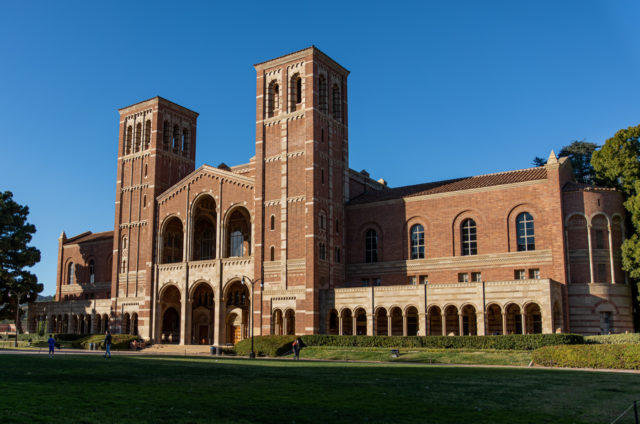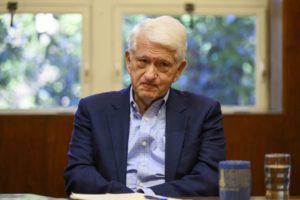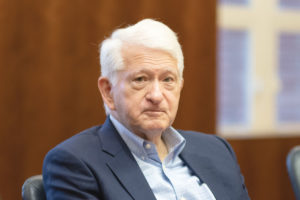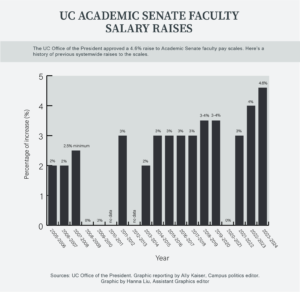UCLA faculty have heightened concerns over the integrity of the Academic Senate’s process to potentially issue an unprecedented no-confidence vote in Chancellor Gene Block, following documents released amid the fallout from Friday’s emergency meeting.
The documents – posted under the agenda for an upcoming meeting May 16 – are a draft of minutes from the nearly three-hour meeting that stalled after faculty could not come to a consensus over whether to vote or halt consideration of the move entirely. The minutes detail how faculty members could not reach motions that two-thirds of all voting members present could agree upon and how Chair of the Academic Senate Andrea Kasko suggested the body pause further deliberations until May 16.
[Related: UCLA Academic Senate Continues Debate on Gene Block’s Censure, No Confidence Votes]
The draft minutes show that motions to proceed with a vote repeatedly failed, such as a vote of 87 in favor, 48 against and two abstentions. Another vote to table consideration also failed, according to the draft minutes.
The minutes also appear to show that two motions to extend debate at the meeting did reach a two-thirds majority in favor, though both were ruled as defeated in the meeting. Defining how two-thirds is calculated has proven to be a matter of debate within the senate, said Michael Chwe, a professor of political science.
The inconsistencies suggest a bind that senate leadership faces: Either a mathematical or clerical error was made by senate leadership and a motion to extend debate should have proceeded Friday, or the draft minutes contain incorrect information about the vote count. Another possibility that has raised concerns from some faculty is that the senate deviated from “The Standard Code of Parliamentary Procedure” by Alice Sturgis, which mandates that two-thirds thresholds exclude those who abstained from voting.
For example, one failed motion to extend the debate around the end of the meeting received 101 votes in support, 44 against and six abstentions, according to the draft minutes. Just over two-thirds of those who cast their votes – totaling to around 69% – were in support of the motion.
“I don’t think that the common practice is a good defense or even a defense at all,” said Chwe, who said he consulted with incoming chair Kathy Bawn about his concerns. “The Academic Senate does say explicitly that we rely on the Sturgis book.”
Bawn did not immediately respond to a request for comment.
Kasko declined to comment on the obtained minutes, given that they were a draft. In an emailed statement, she did not answer questions about the criticisms the senate is facing. She wrote that approximately 170 voting members were present for Friday’s emergency meeting, meaning around 114 professors would have needed to support motions to vote, extend debate, or table consideration for them to pass.
The legislative assembly’s procedures reflect the current edition of “The Standard Code of Parliamentary Procedure” per the UCLA Divisional Manual, according to the senate’s website.
Kasko previously told The Bruin that all voting members present Friday contributed to determining the two-thirds threshold, but she has not yet addressed the concerns faculty posed about this procedure.
During the online meeting, Chwe said it was difficult to determine who was voting or paying attention. He expressed concerns over how all voting members present – even those who do not cast a vote toward a certain motion – are counted toward the vote count’s denominator.
“What breaks my heart is that I think Chair Kasko’s actions, intentionally or unintentionally, have made the legitimacy of the vote now a foregrounded issue as opposed to the vote itself,” said a professor who requested to be anonymous for fear of reprisal. “I do not want to challenge the legitimacy of the vote, because that is a distraction from the vote itself and the outcome.”
The Bruin reported Friday that it was not clear how the resolution to censure, a lighter rebuke than a vote of no confidence, would be impacted by the current deliberations. According to the draft minutes, the censure resolution will be “considered as new business” at the May 16 meeting.
Chwe said he believes the point of the votes to censure or of no confidence is to show the campus that faculty care about the safety of their students.
“We have an obligation to history. We have an obligation to our students,” Chwe said. “To me, this process is about being really clear about what our own values are.”






Comments are closed.